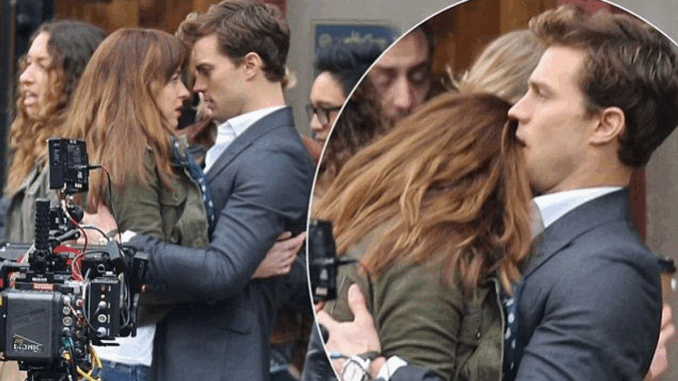
For years, fans believed they knew the real reason Charlie Hunnam walked away from Fifty Shades of Grey. Officially, it was “scheduling conflicts.” Unofficially, it was “creative differences.” But now, more than a decade later, whispers inside Hollywood are telling a very different story — one that centers not on contracts or calendars, but on chemistry.
According to multiple sources close to the early production of Fifty Shades, Dakota Johnson — then an up-and-coming actress stepping into the role of Anastasia Steele — played a far bigger role in shaping the film’s destiny than anyone realized. “She knew exactly what she wanted,” one insider said. “From the tone, to the intimacy, to the man she was going to play opposite.”
And that man, apparently, was never meant to be Charlie Hunnam.
When Universal first announced Hunnam’s casting in 2013, the internet exploded. He was Hollywood’s golden boy at the time — rugged, magnetic, and fresh off Sons of Anarchy. But behind the scenes, things weren’t as picture-perfect as they seemed. “The chemistry tests were… fine,” another source recalled. “But Dakota wasn’t convinced. She kept saying something was missing — that spark.”
That spark, as it turns out, had a name: Jamie Dornan.
Reports now suggest that Dakota quietly pushed for Dornan even before Hunnam officially exited. “She didn’t demand it outright,” one studio insider explained. “But she made it clear. She said, ‘This only works if I can feel it — if I can believe it.’ And when Jamie walked in for the screen test, she just looked at him and said, ‘That’s Christian Grey.’”
It was instant. Electric. The kind of moment casting directors dream of and studios can’t manufacture. Within days, the decision was made. Hunnam’s exit was announced to the public as a matter of “scheduling,” but those close to the project knew the truth: the role had already found its real match.
Charlie’s departure shocked fans at the time, sparking endless rumors of creative burnout and behind-the-scenes tension. But even he later hinted that something deeper had played a role. “It wasn’t the right time for me,” he said cryptically in a 2015 interview. “Someone else was meant to tell that story.”
And tell it they did. The moment Dornan and Johnson appeared together in the first trailer, the world stopped. Their chemistry wasn’t just visible — it was alive. It was what made Fifty Shades a billion-dollar franchise and turned them into one of pop culture’s most dissected on-screen duos.
Looking back now, it’s hard not to see the irony. Hunnam, once set to play the world’s most desired man, faded from the narrative almost completely — while Jamie and Dakota became Hollywood mythology.
“She trusted her instinct,” said a producer who worked closely on the film. “Everyone else saw risk; she saw truth. And she was right. The story needed that tension — that quiet storm between them. Jamie brought that.”
The decision, however, wasn’t without its emotional cost. Industry insiders say Dakota felt “immense pressure” after Hunnam’s exit, blamed unfairly by some executives for “complicating” the process. But in the end, her intuition saved the project from what could have been a completely different — and forgettable — version of Fifty Shades.
Even Jamie himself later hinted that fate played a hand. “I wasn’t the first choice,” he said in an interview years later, “but maybe I was the right one.”
The revelation that Dakota had quietly influenced the casting is now reigniting fan debates. Some call it destiny; others call it manipulation. But one thing is certain — the chemistry between Dakota Johnson and Jamie Dornan defined an era of cinematic passion. Without it, Fifty Shades might never have become the phenomenon it did.
And now, as the truth finally bubbles to the surface, even longtime fans are stunned to realize how close the franchise came to being something — or someone — entirely different.
“She knew,” said one source with a knowing smile. “From the first look, the first read, the first heartbeat — she knew Jamie Dornan was Christian Grey.”
Ten years later, that instinct still feels undeniable.